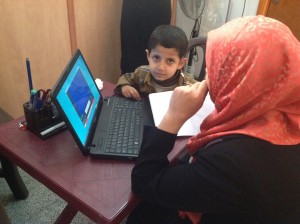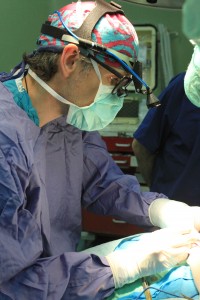Day Six in Gaza: Health care expensive and supplies short, by Gerri Haynes
(Washington Physicians for Social Responsibility has been sponsoring delegations to Gaza since 1993. In 2009, the group began offering medical service work to the people of Gaza.)
Today also, I learned more about the need for a children’s library in the central part of Gaza – an area that has had no library in the last thirty years. The wonderful woman who hopes to organize this library told me of generations of children growing up with no access to books – she hopes to remedy this!
Attention to mental health is a major concern for caregivers here. The continuous threat of attack and the loss of many relatives during recent wars on Gaza have rendered a population at risk for depression and other psychological troubles. I met with university staff who are creating mental health treatment clinics, hoping to alter the cultural sensitivity to mental illness.Bob Haynes spent today seeing patients at Al Shifa Hospital. He writes: Heroism is not seen only on a battlefield, unless you count Gaza as a battlefield. The air, water, streets, and sea are polluted. Supplies coming into Gaza are tightly restricted by Israel, with no goods flowing through the bombed tunnels from Egypt. The export of goods and agriculture from Gaza is severely limited. The economy is contracting from poor to worse, resulting in decreasing wages, rising unemployment and inability to purchase goods and services. And yet, the people of Gaza go on living life with good spirit and even good humor.
In my work at the hospital today, I witnessed a patient’s son as he fluffed the bed pillows and tenderly removed her shoes and socks and straightened her legs on the bed. He continued to tend to her throughout my visit. Her angina pattern has become unstable, accelerating to several times per day. Last week, she had one clogged heart artery opened at this hospital and a stent was placed. Another artery was left untreated, as the correct size stent was not available.
Doctors in multiple clinics on the same floor share one very old computer. When the computer reports that the hospital still does not have the correct sized stent to treat this patient, the doctor informs the patient and family that the stent will not be available for several weeks. After serious conversation in Arabic evolves to light-hearted tones then laughter, I ask what was said. The patient’s family and then the doctor shrug, “What can one do?” The doctor says, “Her son has just become engaged and the family is happy.” I am again amazed and inspired by the spirit of these people in the midst of the Gaza prison.
This evening, we gathered for the staff of Al Awda Hospital to say “Thank you”, particularly to Ismael Zamilpa who will leave Gaza tomorrow. In our conversation, one hospital physician summed up his feelings: “We are exhausted from suffering.”
1 Comment to “Day Six in Gaza: Health care expensive and supplies short, by Gerri Haynes”
RSS feed for comments on this post. TrackBack URI


By Bert Sacks, April 11, 2014 @ 4:45 pm
These stories are an amazing account of the resilience of the human beings living in Gaza. It’s a blessing to be able to read them. Thank you, Bob and Gerri and the whole humanitarian team — and thank you Larry for posting them.